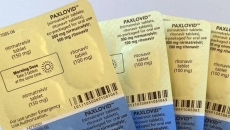Residential school survivors are calling on Canada to criminalize residential school denialism, echoing one of the findings in a report about unmarked graves and burial sites associated with the institutions.
Doug George, a survivor of the Mohawk Institute, said Canadians need to acknowledge the schools' place in history and to ensure the children who died are not silenced.
"Canadians might be, you now, maybe feeling as though it's been a bit overwhelming over the past few years," George said, referencing the announcements from First Nations about their efforts to locate their missing children.
"But you can imagine what it's like for us and our children and our communities? … You can't hide behind these things. You've got to come to grips with it."
He was one of three survivors who spoke in Ottawa about the legislation, and of why they think it's important for survivors and their families.
More than 150,000 Indigenous children were forced to attend residential schools, the last of which closed in 1996.
An estimated 6,000 children died in the schools, though experts say the actual number could be much higher.
Canada's special interlocutor on unmarked graves and missing children said despite the "well-documented reality" of those deaths, some Canadians have made a concerted effort to attack the truths of survivors, Indigenous families and communities.
Kimberly Murray, who was appointed to the role in 2022, released a two-volume report this week after engagements with experts, residential school survivors and their descendants.
Murray noted that denying residential schools enforces a false view of Canadian history and protects those responsible for the system by justifying their actions.
She wrote that many people do not outright deny that residential schools existed and operated, but they misrepresent the intent, outcome and impacts of the system.
"Denialism is not a simple misunderstanding of the facts; whether consciously or unconsciously, denialists are working toward the accomplishment of psychological, practical or political goals," she wrote.
"Indian residential school denialism must be taken seriously because it puts at risk the important work of truth and reconciliation. It should not be dismissed as a harmless fringe phenomenon."
She examined several examples of what she calls residential school denialism, including comments from a politician who said the good deeds of residential schools were being overshadowed by the Truth and Reconciliation Commission, a book that claimed residential schools were necessary and unmarked graves associated with them were a "moral panic" based on "wild accusations," and a Catholic priest who told his congregation that Indigenous children enjoyed their time at the schools.
"This denialism, if unchecked, will become a significant barrier to reconciliation," Murray wrote.
NDP MP Leah Gazan introduced a private member's bill last month that seeks to criminalize residential school denialism. The Liberals have not said whether they will support the legislation, which has little chance of becoming law without government endorsement.
The bill proposes that anyone who, other than in private, promotes hatred against Indigenous Peoples by "condoning, denying, downplaying or justifying the Indian residential school system in Canada or by misrepresenting facts related to it" could be subject to a maximum of two years in jail.
The bill does set out some exceptions. For example, if the statements were true, if they were relevant to public interest, if they were intended to point out hatred toward Indigenous Peoples or if it was a religious opinion, the comments would not be against the law.
Canada enacted a similar law in 2022 to combat Holocaust denialism, though so far no case has been successfully prosecuted under that provision.
Murray has long called for legislation similar to Gazan's bill, saying in an interim report last year that denialism was increasing.
In May 2021, the Tk'emlups te Secwepemc Nation announced ground-penetrating radar had uncovered what are believed to be 215 unmarked graves at the site of the former Kamloops Indian Residential School. That made international headlines and drew the ire of people who attacked the community online.
"Some came in the middle of the night, carrying shovels; they said they wanted to 'see for themselves' if children are buried there," Murray wrote in her interim report.
In her final report, Murray also suggested the government include a provision in the Online Harms Act — legislation that is still being debated in the House of Commons — to address the harms associated with residential school denialism, including missing and disappeared children and unmarked burials.
In a statement, a spokesperson for Justice Minister Arif Virani said Murray's report "offers critical information on the impacts of online harms faced by Indigenous communities," and that it underscores the need for the House of Commons to review Gazan's bill.
Chantalle Aubertin laid the blame on the Conservative party, saying they need to stop a month-long filibuster on a privilege debate in the House of Commons and allow MPs to work on legislation.
But Virani, along with Prime Minister Justin Trudeau and Crown-Indigenous Relations Minister Gary Anandasangaree, has not clearly stated whether the Liberals would move forward with criminalizing residential school denialism when asked.
Anandasangaree said in an interview on Wednesday that the government needs to review the "obligations" that Murray laid out in her final report, saying it would be inappropriate to comment before reading and fully understanding "the true nature of what she's saying."
He previously said he supports the legislation to criminalize denialism.
"If the prime minister, if the minister of Crown-Indigenous relations and the justice minister are serious about reconciliation in this country, survivors, families and communities need protection. And I urge them and encourage them to read the bill and give quick support to the bill," said Gazan.





